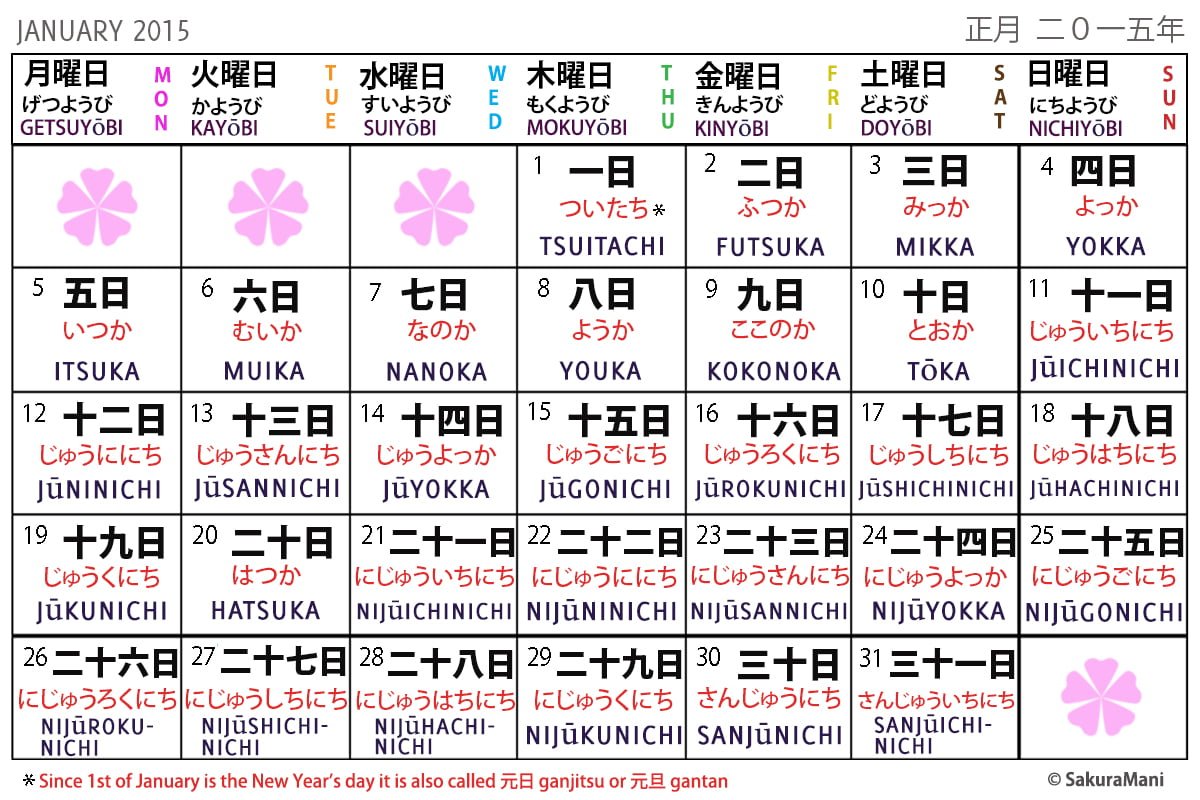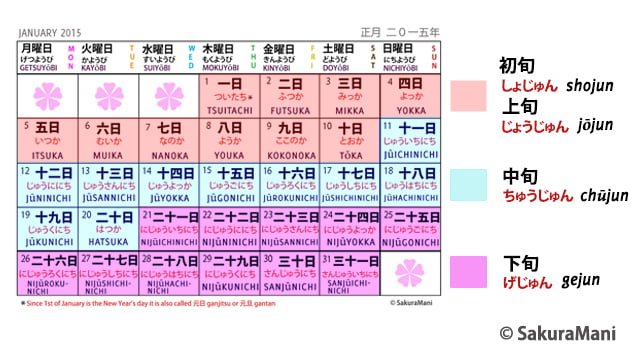After learning the names of months in Japanese, let us learn how to say dates and days of the week in Japanese.
Days of the week are named after the sun, moon and five elements associated with the five planets (Mercury, Venus, Mars, Jupiter and Saturn). This naming system is exactly the same as the Chinese naming system for days.
Days of the week in Japanese
Meanings of the first kanji for each day are as follows: 月moon, 火 fire (Mars), 水 water (Mercury), 金 metal (Venus), 土 earth (Saturn), 日 sun
The last two kanji in all the names are same: 曜日youbi, literally meaning ‘day of the week’.
How to say the dates in Japanese
| English | Kanji | Hiragana | Romaji |
|---|---|---|---|
| 1 | 一日 | ついたち | tsuitachi |
| 2 | 二日 | ふつか | futsuka |
| 3 | 三日 | みっか | mikka |
| 4 | 四日 | よっか | yokka |
| 5 | 五日 | いつか | itsuka |
| 6 | 六日 | むいか | muika |
| 7 | 七日 | なのか | nanoka |
| 8 | 八日 | ようか | yōka |
| 9 | 九日 | ここのか | kokonoka |
| 10 | 十日 | とおか | tōka |
| 11 | 十一日 | じゅういちにち | jūichinichi |
| 12 | 十二日 | じゅうににち | jūni-nichi |
| 13 | 十三日 | じゅうさんにち | jūsan-nichi |
| 14 | 十四日 | じゅうよっか | jūyokka |
| 15 | 十五日 | じゅうごにち | jūgonichi |
| 16 | 十六日 | じゅうろくにち | jūrokunichi |
| 17 | 十七日 | じゅうしちにち | jūshichinichi |
| 18 | 十八日 | じゅうはちにち | jūhachinichi |
| 19 | 十九日 | じゅうくにち | jūkunichi |
| 20 | 二十日 | はつか | hatsuka |
| 21 | 二十一日 | にじゅういちにち | nijūichinichi |
| 22 | 二十二日 | にじゅうににち | nijūninichi |
| 23 | 二十三日 | にじゅうさんにち | nijūsannichi |
| 24 | 二十四日 | にじゅうよっか | nijūyokka |
| 25 | 二十五日 | にじゅうごにち | nijūgonichi |
| 26 | 二十六日 | にじゅうろくにち | nijūrokunichi |
| 27 | 二十七日 | にじゅうしちにち | nijūshichinichi |
| 28 | 二十八日 | にじゅうはちにち | nijūhachinichi |
| 29 | 二十九日 | にじゅうくにち | nijūkunichi |
| 30 | 三十日 | さんじゅうにち | sanjūnichi |
| 31 | 三十一日 | さんじゅういちにち | sanjūichinichi |
Use the below chart to memorize dates and days of the week in Japanese
Dividing a month into three periods
While making plans and schedules, people have to take number of days or a span into consideration. In Japanese, 初旬 shojun or 上旬 jōjun,中旬 chūjun and 下旬 gejun indicate different periods of a month. 旬 means ‘a period of ten days’.
初旬 shojun or 上旬 jōjun indicates the first 10 days of a month.
中旬 chūjun indicates the middle of a month (from 11th till 20th of a month).
下旬 gejun indicates the last third half of a month (from 21st till 30th or 31st of a month).
新しい言葉を習いましょう – Lets learn some new words
today – 今日きょう kyō
yesterday – 昨日きのう・さくじつ kinō/sakujitsu
day before yesterday – 一昨日おととい・いっさくじつ ototoi/issakujitsu
three days back – 一昨々日さきおととい sakiototoi
tomorrow – 明日あした・あす ashita
day after tomorrow – 明後日あさって asatte
three days from today – 明々後日しあさって shiasatte
weekdays - 平日へいじつ heijitsu
weekend – 週末しゅうまつ shūmatsu
holiday – 休日きゅうじつ kyūjitsu
weekly holiday – 週日しゅうじつ shuujitsu
national (festival) holiday – 祭日さいじつ saijutsu
national holiday – 祝日しゅくじつ shukujitsu
Saturday and Sunday – 土日どにち donichi
the other day – 先日せんじつ senjitsu
this week – 今週こんしゅう konshū
last week – 先週せんしゅう senshū
week before last – 先々週せんせんしゅう sensenshū
next week – 来週らいしゅう raishū
week after next – 再来週 さらいしゅう saraishū
date – 日付ひづけ hidzuke
Useful phrases
Q.おたんじょうびはいつですか。otanjōbi wa itsudesuka.
Q.When is your birthday?
A.ついたちいちがつです。tsuitachi ichigatsu desu.
A.It is on the 1st of January.
Q.きょうはなんようびですか。kyō wa nanyoubidesuka.
Q.What day is today?
A.きんようびです。kinyōbi desu.
A.Today is Friday.
展示会は毎年2月下旬から3月初旬にかけて行われる。Tenjikai wa maitoshi nigatsu gejun kara sangatsu shojun ni kakete okonawareru.
The exhibition is conducted every year from the end of February till the beginning of March.


Could you please solve some doubt about Japanese grammar